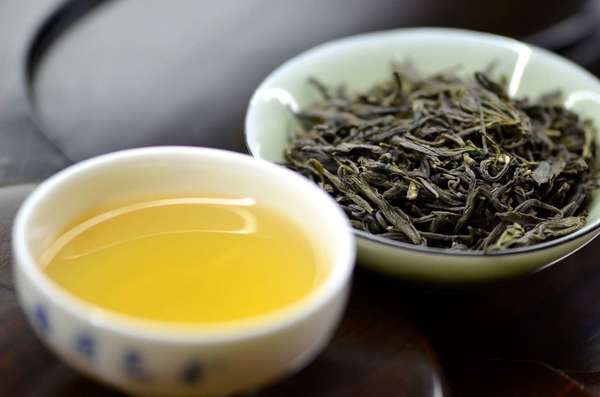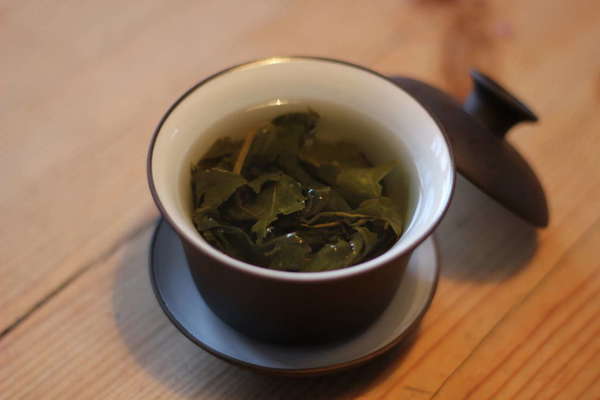Tea and Weight Loss
Wikipedia: Weight_LossLast Updated: Feb. 3, 2015
 Green tea is often touted as a weight-loss product. Photo © yangjoy999, Pixabay License.
Green tea is often touted as a weight-loss product. Photo © yangjoy999, Pixabay License.The Linus Pauling Institute at Oregon State University has conducted an extensive review of the scientific literature surrounding tea, originally written in 2005, and updated several times since then. This review concluded that "It is currently unclear whether tea or tea extracts promote weight loss."[1] However, this review also called for the need for future research to settle the question, and identified a few studies, including some animal studies and human studies, that have provided some evidence that tea may promote weight loss. The topic of tea and weight loss remains an open question.
Are the weight loss properties of tea due to caffeine?
Tea contains caffeine, a natural stimulant, which may aid weight loss, although this is also a disputed relationship without a clear scientific consensus. However, due to the possibility that caffeine may aid weight loss, one must consider whether tea provides any weight loss benefits beyond that due to caffeine alone. Few studies have explored this issue, and it remains another open question. Oolong tea is often promoted for weight-loss, © Micke Nordin, CC BY-SA 2.0
Oolong tea is often promoted for weight-loss, © Micke Nordin, CC BY-SA 2.0Is Wu-yi tea, wu-long (oolong) tea, green tea, or any kind of tea better than other teas for weight loss?
"Wuyi tea" is an unclear and potentially ambiguous term, and usually refers to any tea grown in the Wuyi mountains of Fujian province in China.This region produces mostly oolong teas, although it produces a few other kinds of tea as well. "Wu-long" is simply another term for oolong. Usually, companies selling "Wu-yi tea" or "Wu-long tea" are trying to exploit hype surrounding these teas as weight loss products.
Avoid companies selling tea as a weight loss product
Many of the companies promoting tea as a weight loss product make exaggerated and sometimes even outright false claims about tea's weight loss properites and the scientific evidence. These companies also tend to sell low-quality tea at inflated prices, in an attempt to exploit people's desire to lose weight for their own financial gain. Tea, even high-quality tea, is relatively inexpensive relative to drugs and most nutritional supplements, and scam companies exploit this fact.If you wish to drink tea as part of a comprehensive weight-loss plan, you are best off buying high-quality loose tea from a reputable tea company. This ensures that you receive a quality product at a reasonable price.
Herbal teas for weight loss
A number of herbal teas have been proposed or sold for weight loss purposes; these herbal blends are often called slimming teas. Many of the herbs used in these blends are unsafe and pose numerous health risks. Often, herbal blends promoted for weight loss purposes contain laxatives, which can cause a person to lose weight, but at the expense of causing intestinal problems and other health problems with long-term use. Another ingredient in some weight loss blends is ephedra, a stimulant which is known to raise blood pressure, and has been implicated in a number of serious side-effects, including death. Ephedra was banned in the U.S. by the FDA, but this ban was weakened by a federal court, and low doses of it are allowed to be sold.[2] Herbal teas marketed for weight loss purposes are best avoided. The only healthy path to weight loss involves a healthy, balanced diet. © Med Coolman, CC BY 2.0
The only healthy path to weight loss involves a healthy, balanced diet. © Med Coolman, CC BY 2.0There is only one healthy path to weight loss
Medline plus, citing official positions of the American Dietetic Association, American Heart Association's Nutrition Committee, US Dept of Health and Human Services and US Dept of Agriculture, recommends eating a healthy, well-balanced diet, engaging in aerobic exercise, and making gradual (rather than sudden) changes in eating and lifestyle.[3]In summary
Although there is some scientific evidence that tea may aid weight loss, whether or not this is actually true remains an open question. It is also unclear whether any weight-loss properties of tea are due to caffeine alone, or are due to other components of tea. There is no evidence that any particular types of tea are better than others for the purpose of weight loss. Companies marketing tea as a weight loss product often sell tea of inferior quality at high prices. The only healthy and medically-recommended approach to weight loss is to eat a well-balanced diet and get regular aerobic exercise.References:
1. Tea - Linus Pauling Institute at Oregon State University: Weight loss
2. Federal Court Weakens FDA's Ephedra Ban, WebMD News, April 15, 2005.
3. Weight management, New York Times, Retrieved Feb. 3, 2015.

